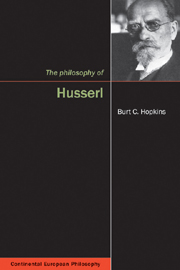Book contents
- Frontmatter
- Contents
- Acknowledgements
- Abbreviations
- Prolegomenon: Husserl's turn to history and pure phenomenology
- I Plato's and Aristotle's theory of eidē
- II From descriptive psychology to transcendentally pure phenomenology
- 4 Origin of the task of pure phenomenology
- 5 Pure phenomenology and Platonism
- 6 Pure phenomenology as the transcendental-phenomenological investigation of absolute consciousness
- 7 Transcendental phenomenology of absolute consciousness and phenomenological philosophy
- 8 Limits of the transcendental-phenomenological investigation of pure consciousness
- III From the phenomenology of transcendental consciousness to that of monadological intersubjectivity
- IV From monadological intersubjectivity to the historical a priori constitutive of all meaning
- V The unwarranted historical presuppositions guiding the fundamental ontological and deconstructive criticisms of transcendental philosophy
- Epilogue: Transcendental-phenomenological criticism of the criticism of phenomenological cognition
- Coda: Phenomenological self-responsibility and the singularity of transcendental philosophy
- Notes
- Bibliography
- Index
7 - Transcendental phenomenology of absolute consciousness and phenomenological philosophy
from II - From descriptive psychology to transcendentally pure phenomenology
- Frontmatter
- Contents
- Acknowledgements
- Abbreviations
- Prolegomenon: Husserl's turn to history and pure phenomenology
- I Plato's and Aristotle's theory of eidē
- II From descriptive psychology to transcendentally pure phenomenology
- 4 Origin of the task of pure phenomenology
- 5 Pure phenomenology and Platonism
- 6 Pure phenomenology as the transcendental-phenomenological investigation of absolute consciousness
- 7 Transcendental phenomenology of absolute consciousness and phenomenological philosophy
- 8 Limits of the transcendental-phenomenological investigation of pure consciousness
- III From the phenomenology of transcendental consciousness to that of monadological intersubjectivity
- IV From monadological intersubjectivity to the historical a priori constitutive of all meaning
- V The unwarranted historical presuppositions guiding the fundamental ontological and deconstructive criticisms of transcendental philosophy
- Epilogue: Transcendental-phenomenological criticism of the criticism of phenomenological cognition
- Coda: Phenomenological self-responsibility and the singularity of transcendental philosophy
- Notes
- Bibliography
- Index
Summary
Inadequate and adequate evidence: the Leibnizian precedent
In addition to these five characteristic and enduring basic elements of Husserl's initial philosophical self-interpretation of the significance of the transcendental reduction, other aspects of his initial self-interpretation are either modified or significantly recast in the course of his phenomenology's development. The revision and correction of previous claims is consistent with Husserl's self-understanding of phenomenology as rigorous science. Thus, in contrast to the cognitive pretension of a philosophical system, which is to endure fundamentally without change throughout time, Husserl understood phenomenological cognition to take place in concrete research devoted to specifically phenomenological problems, and to produce cognitive claims that are, in principle, revisable. The general heading of these problems is the previously mentioned analyses of constitution, which are then further specified on the basis of Husserl's ongoing phenomenological research. The second stage of the development of Husserl's phenomenology, which is coincident with what is sometimes called the “transcendental turn” of Ideas I, identified as the major areas of phenomenological research the constitution of the unity proper to phenomenon of the world, including that of the various material regions of objects, and the constitution of the unity of lived-experiences. In addition to these research areas, Husserl's third stage added the constitution of the genesis of meaning as well as the constitution of intersubjectivity. And, in the fourth and final stage of the development of his thought, Husserl introduced the constitution in history of meaning, including the a priori meaning of the formal sciences, as transcendental phenomenology's most pressing, if not most fundamental, problem.
- Type
- Chapter
- Information
- The Philosophy of Husserl , pp. 125 - 138Publisher: Acumen PublishingPrint publication year: 2010



